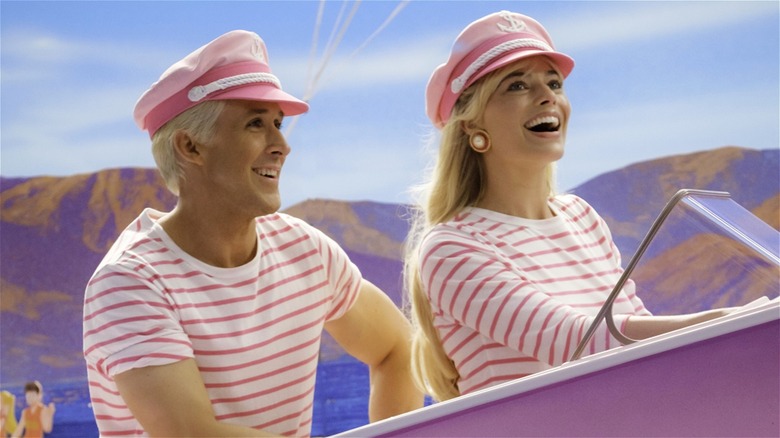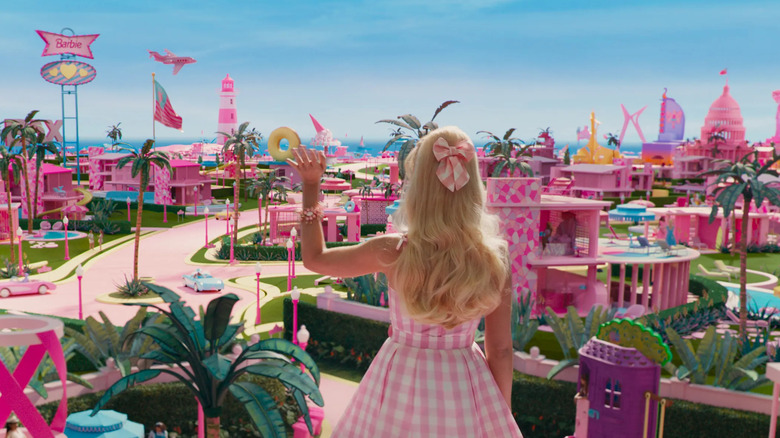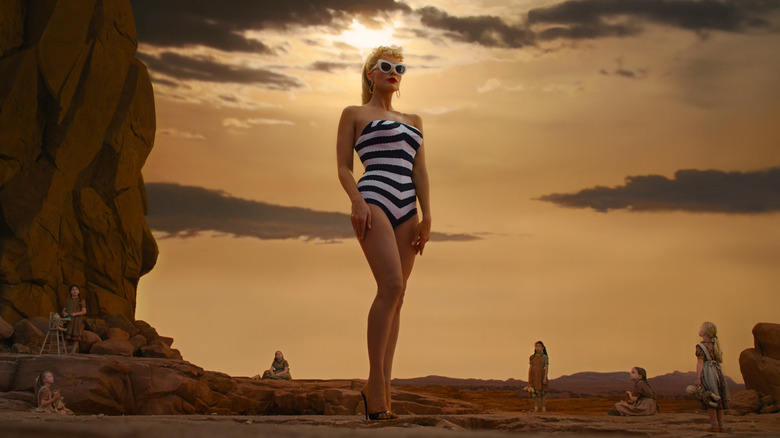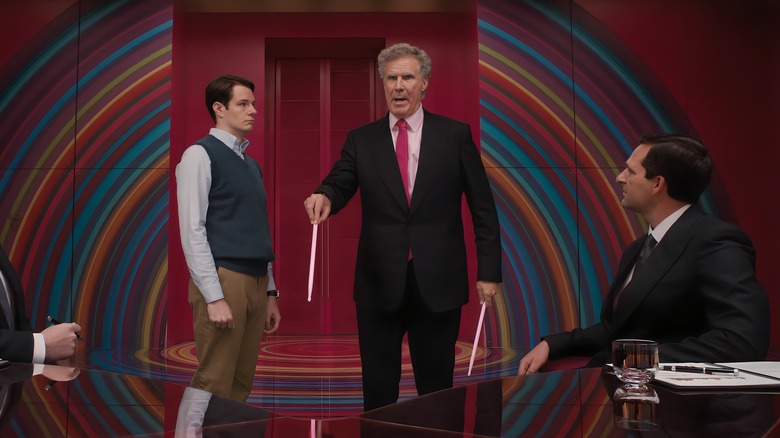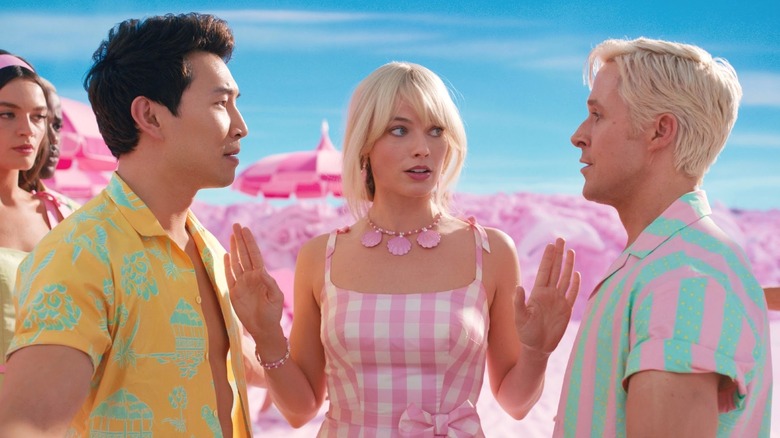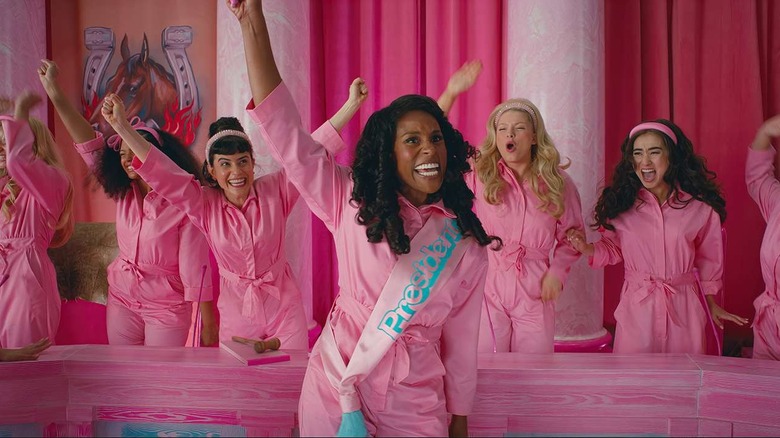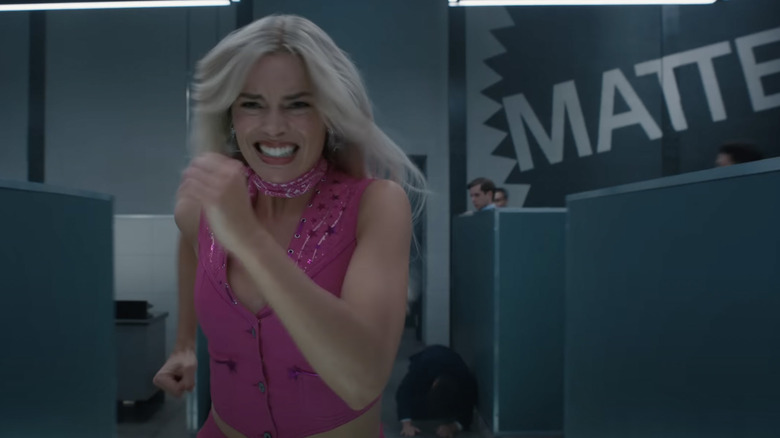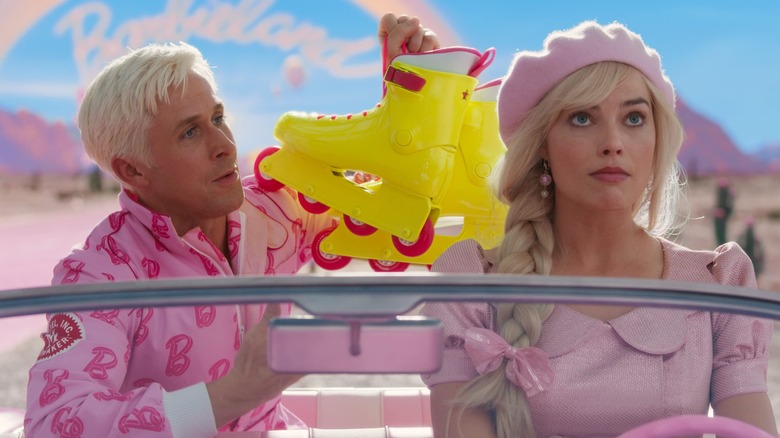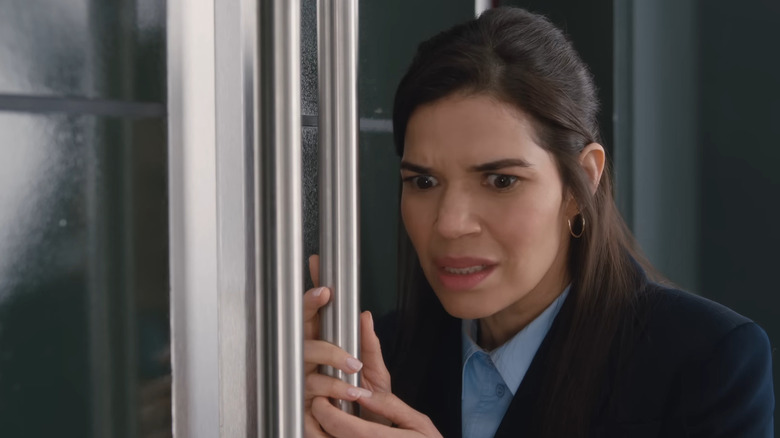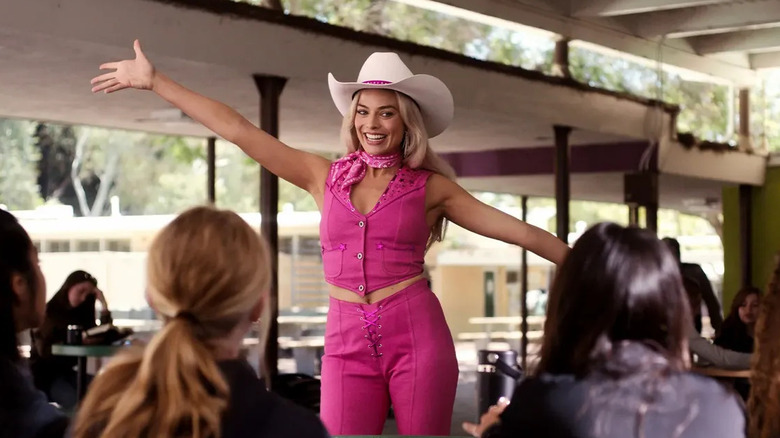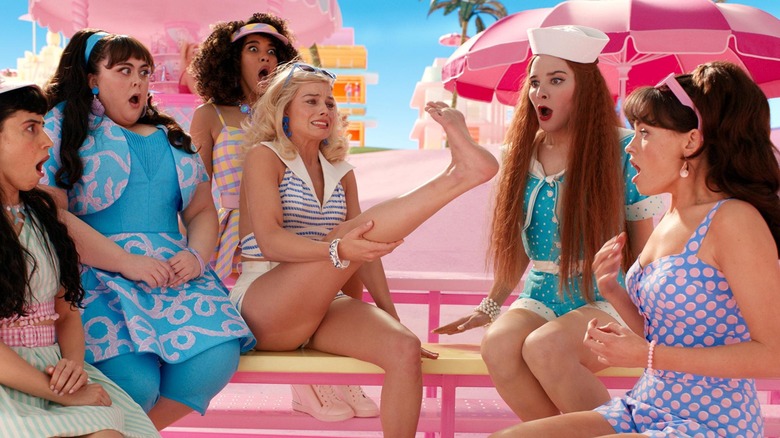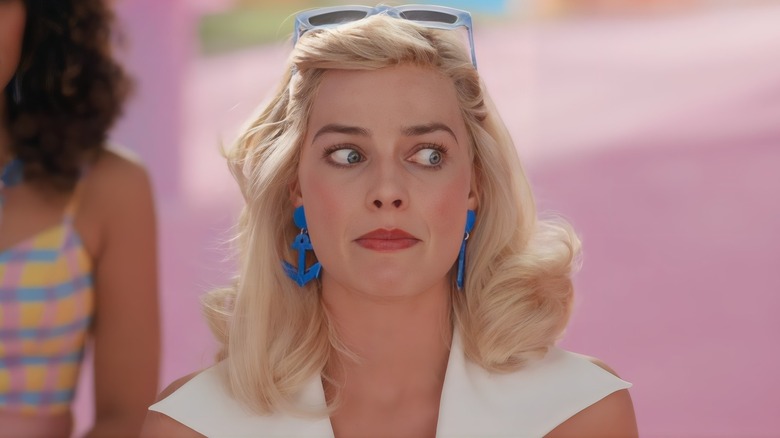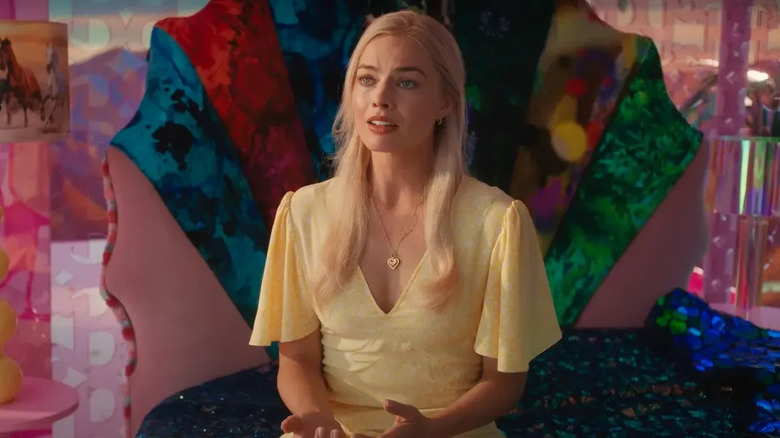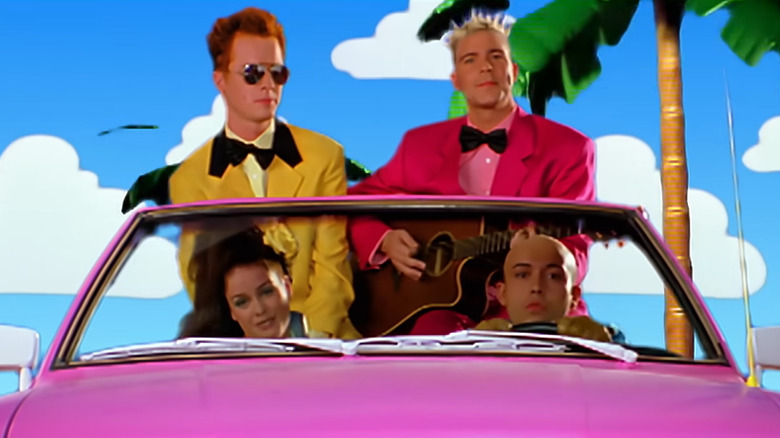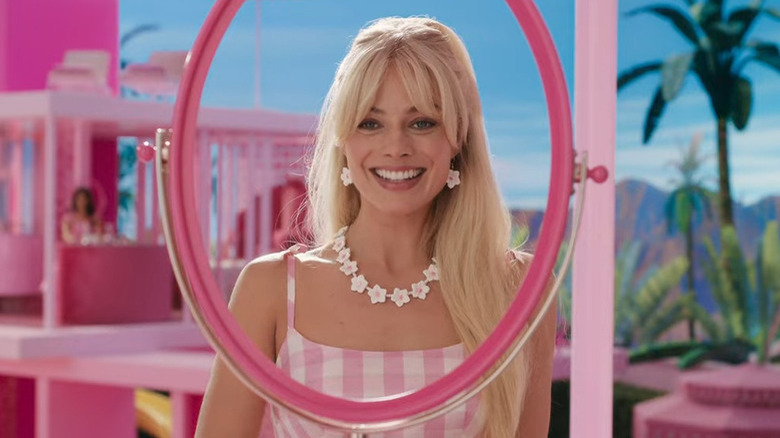Things Only Adults Notice In Barbie
When the "Barbie" movie was announced back in 2019, moviegoing audiences probably assumed that the story of America's most famous doll would be aimed squarely at the demographic that plays with them: little kids. But with indie darling Greta Gerwig signed on as co-writer and director, "Barbie" was always going to be more than a candy-colored cash grab. The release of a high-concept teaser followed by a cheeky official trailer were strong indications that "Barbie" had more on its mind than product placement and placating the 12 and under crowd. And judging by the extremely effective viral marketing campaign, Gerwig's film was, first and foremost, targeting the demographic of women who grew up with Barbies and who, perhaps, now had children of their own.
Indeed, the plot of "Barbie" largely revolves around an X-lenniel mom who's struggling to connect with her Gen Z daughter. Though contemporaries of teenage Sasha (Ariana Greenblatt) will surely enjoy "Barbie," and while even younger kids can see it, the movie will be most appreciated by cohorts of America Ferrara's Gloria. That's because Gerwig's take on "Barbie" is thematically and tonally ambitious, and full of Easter eggs and references that only viewers of a certain age will catch. Unlike the savviest kids movies that pack in enough jokes to amuse the grown-ups, "Barbie" is a subversive and campy yet earnest parable that's unapologetically for adult women, with fun elements that will hold their daughters' attention. These are the things about "Barbie" that make the movie work on an entirely different level for the Glorias of the world.
Dolly details
As the voiceover in "Barbie" points out, the Barbies don't always behave like humans do because they're dolls being played with by humans. For example, kids rarely use the staircases that come with Barbie Dreamhouses, which is why Margot Robbie's Stereotypical Barbie simply floats three stories to the ground below (at least until she's in the midst of an existential crisis) when she needs to get to the first floor. Similarly, the water at the beach is stuck in a permanent plastic cresting wave, so when Ryan Gosling's Ken tries to dive in and impress Barbie, he ricochets off the solid water and ends up (very temporarily) in the hospital. Those details are pretty obvious, as is the fact that when Barbies take showers or pour drinks, no liquid actually comes out of the faucet or the milk carton.
But look a little closer at the Barbieland that Greta Gerwig and production designers have created, and even more accurate and hilarious dolly details will reveal themselves. Any parent who's ever put together a dollhouse will recognize the stickers that make up the contents of Barbie's refrigerator or the water in Barbie's pool. And, when Ken requires medical attention, the ambulance-slash-hospital folds out, revealing more stickers plus exact replicas of the plasticky hinges that allow such play sets to fold back up at the end of the day for easy storage. Plus, when Barbie's driving her pink convertible, she doesn't always have her hands on the wheel. These creative decisions not only make Barbieland feel more authentic to the source material, they're great visual jokes and part of why "Barbie" is one of the funniest movies of the year.
Allusions to other movies
The teaser trailer for "Barbie" that hit YouTube in December 2022 generated buzz for being a parody of Stanley Kubrick's "2001: A Space Odyssey." Fans may have assumed the clip was just clever advertising, and that only the final frames of the teaser contained footage from the movie itself. But the "2001" riff actually appears in "Barbie" as a prologue of sorts. From there, Greta Gerwig's film contains myriad references to famous films that came before it, and many of them are from before Gen Z's time.
When Ken crosses into the real world, he discovers "Rocky" and adopts Sylvester Stallone's personal style as his own. Later, when the Barbies conspire to overthrow the Kens, one pretends to have never seen "The Godfather," triggering a mansplaining watch session. The most overt nod is to another Warner Bros. film. When Alexandra Shipp's Writer Barbie is deprogrammed, she can't believe she was so invested in the Snyder cut while under the Kens' influence.
More subtle allusions to other classics can be found throughout Gerwig's film, which she readily admits was inspired by movies such as "The Wizard of Oz" and "The Truman Show." Barbie's disco party resembles the dancing and set from "Saturday Night Fever"; The choice of a Manolo Blahnik or a Birkenstock is a spoof of the red and blue pills in "The Matrix"; The Kens travel on horseback à la the knights in "Monty Python and the Holy Grail"; and the musical battle of the Kens features iconography and choreography that's similar to "West Side Story" and "Grease."
Clever casting and cameos
"Barbie" has a stellar cast, led by Margot Robbie and Ryan Gosling, who are getting Oscar buzz for their performances. It's rounded out by a mix of comic legends like Rhea Perlman and Kate McKinnon, and emerging stars such as Emma Mackey, Simu Liu, and Kingsley Ben-Adir. In particular, including Will Ferrell as Mattel's CEO was a stroke of brilliance. "Barbie" closely parallels 2003's "Elf" and 2014's "The Lego Movie," both of which feature Ferrell doing some of his best work. Like Buddy, Barbie is a too-innocent fish out of water once she reaches the real world — and like Emmett, she learns that she doesn't have to be an astronaut or the president to be special. Ferrell is the goofy protagonist in "Elf" and the evil Lord Business in "The Lego Movie." Here, he's another corporate villain, and one who makes the inverse of Buddy's journey. Kids may recognize him from his earlier appearances, but only perceptive teens and adults will understand what Greta Gerwig's doing with this stunt casting.
Wrestling fans probably caught John Cena's cameo as a mermaid, but other cameos would be lost on younger viewers. Annie Mumolo shows up as Anxiety Mom. Mumolo is the co-writer and co-star of 2021's "Barb & Star Go to Vista Del Mar," another comedy that shares an aesthetic and tone with "Barbie." Gerwig's partner in screenwriting and life, Noah Baumbach, can be spotted for a split second looking sad on a bench. And speaking of benches, the older woman who tells Barbie that she knows she's beautiful is Academy Award-winning costume designer and friend of Gerwig's, Ann Roth. Finally, Helen Mirren is the film's narrator.
Double entendres
To the surprise of parents everywhere, "Barbie" was released with a PG-13 rating. It's not unusual for family films to earn that designation — every entry in the Marvel Cinematic Universe and most "Star Wars" films carry the same rating, and so do blockbusters like "The Lord of the Rings" and "Jurassic Park." Most of those contain significantly more cursing and violence than "Barbie" does, so why wasn't a movie about a children's toy able to pass for PG? One reason could be the number of double entendres in the script. In fact, in one of the more adult scenes, Barbie herself points out that the construction workers' catcalls are entendres that are double. In other words, "Barbie" is full of jokes that are specifically designed to go over kids' heads.
The first one audiences encounter is a gag that was featured in the trailer. The Kens, trying to out-Ken each other, repeatedly threaten to beach each other off ... as "beach" is Ken's career. Later, Gosling's Ken suggests he wants to stay over at Robbie's Barbie's Dreamhouse, though he doesn't fully understand the idiom. And in France, even the poster for "Barbie" was a double entendre. The tagline, "Elle peut tout faire. Lui, c'est juste Ken," takes on an entirely different meaning in that language.
Feminism and patriarchy
Anyone who's ever seen a Greta Gerwig movie should've expected there to be feminist themes. But as it turns out, the whole premise of "Barbie" is a feminist exercise that examines patriarchal society by comparing it to the girl-powered fantasy of Barbieland. The Barbies mistakenly believe that, because they've achieved something beyond parity, real women in the real world face no obstacles in attaining their dreams. Once in Los Angeles, Barbie is shocked (and Ken is thrilled) at how wrong they were. Barbie feels the constant looming threat of physical and sexual violence, while Ken feels only affirmation. She's flabbergasted at the all-male board of directors at Mattel, while Ken asks for a high-powered, high-paying job at a different company, and an executive tells him they still do patriarchy ... they're just better at hiding it.
When the Barbies re-ratify their constitution, it's telling that they only let Kens serve on lower circuit courts. Of course this is unfair, but the dark joke is that it took women centuries of small steps like these to get where they are today, which is still nowhere near full equality based on pay and representation. In the end, Barbie chooses neither love nor career, but finding out who she really is during the course of a finite and imperfect life, which is its own kind of feminist statement. But Gerwig really drives home her point with Gloria's rousing monologue, during which she laments how impossible it is to live "right" as a female. "Either you're brainwashed or you're weird and ugly; there is no in-between," she says. If "Oppenheimer" is about how hard it is to be an extraordinary man, "Barbie" is about how hard it is to be an ordinary woman.
Corporate meta-commentary
Gloria's epiphany inspires her to pitch the idea of an Ordinary Barbie. Will Ferrell's CEO character assumes it would never sell, but when an underling does some quick calculations and informs him that Ordinary Barbie would be a hit and make money, the boss changes his opinion on a dime. The underlying message throughout anything having to do with the Mattel plot is that, no matter how much the company claims it exists to altruistically show girls and women that they can be anything they want to be, they'd box up and put a price tag on any hunk of plastic that would sell. That becomes apparent when Barbieland-turned-Kendom's effect on the real world transforms Barbie Dreamhouses into Ken Mojo Dojo Casa Houses and they start flying off of store shelves.
Though "Barbie" is, unavoidably, a corporate tie-in and a product in and of itself, Greta Gerwig's and Noah Baumbach's script takes pains to interrogate the many ways in which capitalism and Barbie are inextricably linked. At one point, Margot Robbie's Stereotypical Barbie describes her self-worth by proudly claiming that she's accumulated a lot of great stuff. That's certainly a tongue-in-cheek indictment of consumerism as identity; so is the fact that execs try to get and keep Barbie in her box by handcuffing her with twist ties.
Ironically, the movie that pokes fun at its own capitalist benefactor is also making a ton of dough, not only from better-than-expected ticket sales but from corporate collaborations with companies from Crocs to Cold Stone Creamery. This irony as well as "Barbie's" meta-commentary on commerce are beyond the interests of grade school-aged moviegoers.
Nostalgia
One of the biggest clues that "Barbie" is not-so-secretly for 30-somethings and up is the fact that so much of the world Greta Gerwig recreates is from the '80s and '90s. But some of the reference points go back even further into Barbie history, which is itself a subplot thread in the movie. The prologue tells the tale of Barbie's arrival on the scene as girls stare at the original 1959 Barbie in her black and white chevron bathing suit. From there, the story pauses to make note of either iconic or ill-advised products from Barbie's past.
There's Barbie's purple and silver Ice Capades outfit from 1990, plus vintage disco and paisley numbers; Gloria gets giddy when she notices the 1985 treehouse set she had as a child upon driving through Barbieland; and Weird Barbie's (Kate McKinnon) pooping dog has been released by Mattel multiple times. While kids might think some of the bad idea Barbies and Kens are funny, only mature "Barbie" viewers will feel nostalgia for Allan (Michael Cera), Midge (Emerald Fennell), Growing Up Skipper (Hannah Khalique-Brown), Barbie Video Girl (Mette Towley), Sugar Daddy Ken (Rob Brydon), and Earring Magic Ken (Tom Stourton). Jokes — like the fact that Skipper (Erica Ford) tried to take two toddlers surfing — land better for fans who may have actually played with these discontinued dolls.
Female anxiety
"Barbie" is possibly the most fun movie about anxiety and depression ever made. Kids may have heard of those terms before, and some may have even experienced them. After all, the film's inciting incident has to do with Stereotypical Barbie's fear of death, which leads her to seek out the girl who owns her so that she can figure out why she's so sad. But "Barbie" isn't about generalized anxiety. It's about female anxiety — the kind that grips girls as they go through puberty and become women (as symbolized by Sasha) and the kind that hinders adult women trying to (as Gloria puts it) just get through the day. There's also the kind that Depression Barbie from that faux commercial experiences while she's eating a family-sized bag of Starbursts and watching "Pride and Prejudice" again.
Barbie's own anxiety begins when she realizes she has bad breath ... the first sign of a previously unthinkable imperfection. From there, she begins to fret about cellulite and not being beautiful anymore. Sasha and Gloria are clearly struggling, too. It's strongly implied that societal expectations play a role in these deep-seated worries. "Barbie" puts forth that cultural norms mean women have little choice but to stress about their looks, their demeanor, their intelligence, their professionalism, and their parenting in ways that men, perhaps, are not. That doesn't mean men don't have their own anxieties or that people don't, regardless of gender, harbor similar fears. It's just that "Barbie" is relating specifically to an audience of women who've tried to have it all and found it mentally and physically exhausting.
Religious allegory
"Barbie" sure seemed lighthearted from those commercials. But, in addition to its weighty thoughts on the role of gender in society, Greta Gerwig's "Barbie" is really interested in death and deities. Yes, Barbie's existential dread stems from Sasha and Gloria's issues, but Stereotypical Barbie goes on to have an emotional and spiritual crisis all her own. While she's trying to escape from Mattel headquarters, Barbie opens an unmarked door and wanders into a kitchen where a mysterious white-haired woman begins to give her some advice. The most ardent Barbie fans may have guessed it ahead of time, but eventually, we learn that this is Ruth Handler (Rhea Perlman), inventor of Barbie (or the ghost of Ruth Handler; she died in 2002).
Barbie concludes with a moving scene in which the sentient doll literally meets her creator. Ruth tells Barbie that she was named after her daughter Barbara, which adds even more meaning to the film's rumination on the relationships between mothers and daughters. In facing her god, Barbie must also face a difficult choice. She can live forever in her dreamworld, or she can live once in the real world.
Another interpretation of her journey mirrors the story of Adam and Eve — but in reverse, as far as Ken is concerned — in which humans are expelled from the Garden of Eden. Ultimately, Barbie decides that being a person is better than being an idea (which leads to that hysterical final line of dialogue), and accepts the imperfection of life. These religious themes are no accident; Gerwig told the Associated Press that the biblical stories from her Catholic upbringing were foundational to "Barbie."
Inclusion
We're living through a cultural pendulum swing in which identity politics have become increasingly hot-button, especially in the spheres of the entertainment industry and advertising. Disney remakes starring non-white actors generate anger online, and brands like Bud Light, Target, and even Chick-fil-A have come under fire by organized opposition for supporting the LGBTQ community and diversity initiatives. There's been a backlash to "Barbie," at least on social media if not at the box office, but it's primarily centered on the perception that the film is anti-man. The fact that a trans actress — Hari Nef — plays Doctor Barbie has gone relatively unchallenged in the mainstream, as has the fact that the film showcases multiple Barbies and Kens of color.
That's probably because, despite the fact that the doll the movie is based on is blonde, buxom, and often sexualized, there's no real sexuality in "Barbie" at all. Not to mention, the film is having fun with gender norms while both embracing and rejecting them. Barbie reminds people that she and Ken don't have genitals, and they don't so much as kiss. Most kids likely left the theater never having realized Nef is a trans actress. Similarly, most likely never gave a second thought to the diverse Barbies and Kens because the toy line itself has been multiracial since 1968. Plus, "Barbie" also features a Barbie who uses a wheelchair in the disco party scene, like the one that hit store shelves in 1997.
Breaking the fourth wall
"Barbie" goes in some rather unexpected directions at times. Not only is the screenplay chock full of Easter eggs involving the eponymous toy line, but there are several jokes that break the fourth wall. This refers to the dividing line between the world that we, the viewers, inhabit, and the world of the film and its fictional characters. If you've ever watched a TV show or a cartoon and seen a character looking toward the camera and winking directly at you, then you've seen a fourth wall break before.
While kids might get a mild chuckle out of gags like these, fourth wall humor is, more often than not, directed at the adults in the audience. A prime example of "Barbie" using this self aware humor arrives close to the film's climax when Barbie is at her emotional low point. As she wallows in her newfound self pity, Barbie notes that she isn't stereotypically pretty anymore, a development undercut by the fact she still looks like Margot Robbie — and that's the joke.
Even on a bad day, Margot Robbie is still one of Hollywood's most attractive stars. The film itself is definitely aware of this, as the narrator (Helen Mirren) chimes in to say: "Note to the filmmakers: Margot Robbie is the wrong person to cast if you want to make this point." Adults definitely noticed this gag, and many of them hated it. Twitter user @kookygoblin was "kinda upset" by the line. To them, this joke was "reinforcing the idea that there ARE women who could complain abt 'being ugly' and that would be valid bc they aren't beautiful like Margot Robbie."
Barbie's existential crisis
One of the best things about "Barbie" is how it keeps you on your toes with its occasional adult humor. We already touched on some of the film's more risqué jokes and double entendres, but it goes deeper than that. The film's inciting incident is Barbie — who is used to her serene plastic world — being suddenly troubled with human issues such as cellulite and even thoughts of death. These new feelings result in Barbie's cheerful daily rhythms being disrupted and even cause her feet to touch the ground.
Of course, the vast majority of kids will be unaware of what cellulite (defined by WebMD as "fat beneath your skin that causes a lumpy, cottage cheese look on your thighs, rear end, hips, and belly) even is. Children don't tend to dwell on concepts like their own mortality like grown-ups do. When Barbie says "Do you guys ever think about dying?" during her big party, it's just a wacky record-scratch moment for the kids in the audience, but this dark joke hits differently for adults, most of whom have considered their own mortality at some stage.
Aqua's Barbie Girl
As the release date for "Barbie" drew closer, people became curious to see if Aqua's "Barbie Girl" would be used in the film. This catchy single became a cultural phenomenon in the late-90s, and Mattel launching a lawsuit against the Danish/Norwegian pop group only generated more interest. According to CNN, the toy giant claimed that the lyrics of the song "associate sexual and other unsavory themes with Mattel's Barbie products," but the suit was unsuccessful.
In a full circle moment, the song made it into Greta Gerwig's "Barbie" — sort of. Aqua's classic was remixed by Nicki Minaj and Ice Spice into a new track titled "Barbie World," which closes out the film during the flashy ending credits. This is obviously far more exciting for the adult viewers, seeing as many of the kids in the audience probably weren't alive when "Barbie Girl" spent 16 weeks on the Billboard Hot 100. Incidentally, the remixed version of the song peaked at the same position, reaching the seventh spot on the Hot 100.
The final line
Generally speaking, a film's final note is its most important one. In the case of "Barbie," Greta Gerwig opts to cut to the end credits after an absolutely pitch-perfect joke. The film concludes on Barbie herself, having followed through on moving to the real world and becoming an everyday person. We see Gloria, Sasha, and Sasha's dad drop her off somewhere before wishing her luck — with what, we aren't told just yet.
She introduces herself as "Handler, Barbara" (a nod to Ruth Handler's real-life daughter, who doesn't have a cameo in the film despite rumors to the contrary) to a secretary who then asks how she can help. Barbara then says, with childlike wonder in her eyes, that she's there to see her gynecologist, fully confirming her human status in the bluntest way possible. This line more than likely led to several children asking their parents just what a gynecologist is.
According to Gerwig, ending on "a mic drop kind of joke" was always the plan, but she went for this because it works on two levels — it's funny for adults, but it also normalizes medical check-ups for women. "When I was a teenage girl, I remember growing up and being embarrassed about my body, and just feeling ashamed in a way that I couldn't even describe," the filmmaker told USA Today. "To see Margot as Barbie, with this big old smile on her face, saying what she says at the end with such happiness and joy — I was like, if I can give girls that feeling of, 'Barbie does it, too,' that's both funny and emotional."
